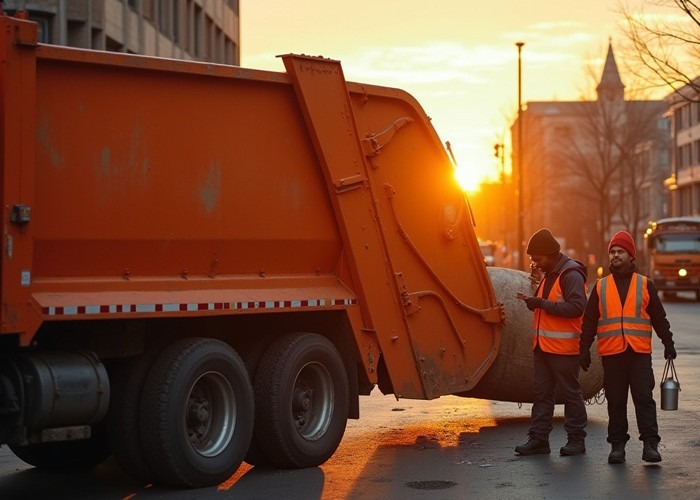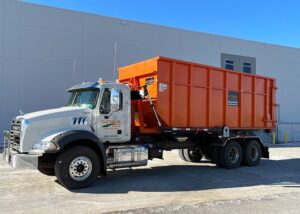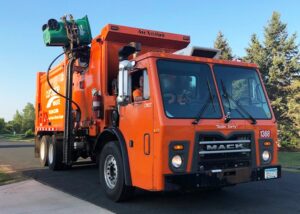Starting a construction project isn’t just about putting up walls or pouring concrete – there’s a lot of mess that comes with it, too. From materials to debris, the waste generated can quickly pile up. This is where waste disposal for construction comes in. Proper waste management not only keeps your work site clean but also ensures safety, reduces environmental impact, and complies with local regulations. Let’s see why it’s crucial to manage waste properly during construction and how it helps your project run smoothly.
What Does Construction Waste Disposal Involve?
Construction waste disposal refers to the process of collecting, transporting, and properly disposing of waste materials generated during a construction or renovation project. These materials can include old structures, leftover building materials, debris from demolished parts of a building, and much more. The waste is typically separated into different categories, such as recyclable materials, non-recyclable items, and hazardous materials.
Why Is Proper Waste Disposal Crucial?
- Compliance with Regulations – Each construction site is subject to local waste management laws. If waste is not disposed of properly, it can lead to fines or project delays. A clear waste disposal plan ensures that your project stays on track and compliant with all regulations.
- Safety on Site – Construction sites are often full of heavy machinery, equipment, and workers. Disorganized or overflowing waste can create safety hazards. For example, sharp objects, unstable piles of debris, or toxic materials can cause accidents. Regular removal of waste from the site keeps the area safe for everyone involved.
- Environmental Impact – Building projects can generate significant amounts of waste. Without proper management, a large portion of this waste may end up in landfills, contributing to environmental damage. By separating recyclables and non-recyclables and using eco-friendly disposal methods, you can minimize your environmental impact and support sustainability.
How Does Waste Disposal for Construction Work?
Managing waste for construction involves using the right equipment, planning, and regular service. Some of the common methods used for disposal include:
- Roll-off Dumpsters – One of the most common solutions for large-scale construction projects is using roll-off dumpsters. These dumpsters come in various sizes, typically ranging from 10 to 40 yards. Roll-off dumpsters are ideal for collecting large amounts of debris, if it’s from a demolition project or leftover materials from a renovation.
- Recycling and Sorting – Not all waste from a construction site needs to go to a landfill. Many materials, such as wood, metal, glass, and concrete, can be recycled. Sorting the waste into separate bins for recycling is important for a more sustainable disposal plan. Many dumpster services for commercial projects in Minneapolis offer options for recycling, making it easier for contractors to go green.
- Hazardous Waste Disposal – Construction sites can sometimes generate hazardous waste, such as asbestos, paints, or solvents. Special care is needed to dispose of these materials properly, as improper disposal can pose serious health risks and environmental harm.
Final Outlook
If you’re looking for a waste disposal partner who understands the needs of construction projects, look no further than Curbside Waste. With years of experience and a focus on customer satisfaction, we offer efficient waste disposal for construction solutions for both commercial and residential projects. From roll-off dumpsters to eco-friendly disposal options, we ensure your construction project is completed with minimal waste impact and maximum efficiency. Contact us to help keep your project on track with stress-free waste disposal.
Frequently Asked Questions
- What is construction waste disposal?
Construction waste disposal involves collecting, transporting, sorting, and properly disposing of materials like debris, old structures, and leftover building supplies generated during construction or renovation. - Why is proper waste disposal important for construction projects?
It ensures compliance with regulations, maintains safety on the work site, minimizes environmental impact, and helps construction projects run more smoothly and efficiently. - What materials are typically included in construction waste?
Common materials include concrete, wood, drywall, metal, glass, packaging, insulation, and sometimes hazardous substances like paints or asbestos. - How can construction waste be disposed of responsibly?
By using roll-off dumpsters, recycling and sorting waste into categories, and working with a service provider that offers eco-friendly and compliant disposal solutions. - What are roll-off dumpsters, and how do they help in construction waste disposal?
Roll-off dumpsters are large waste containers used on construction sites to collect debris. They come in various sizes and are ideal for managing large volumes of waste efficiently.




